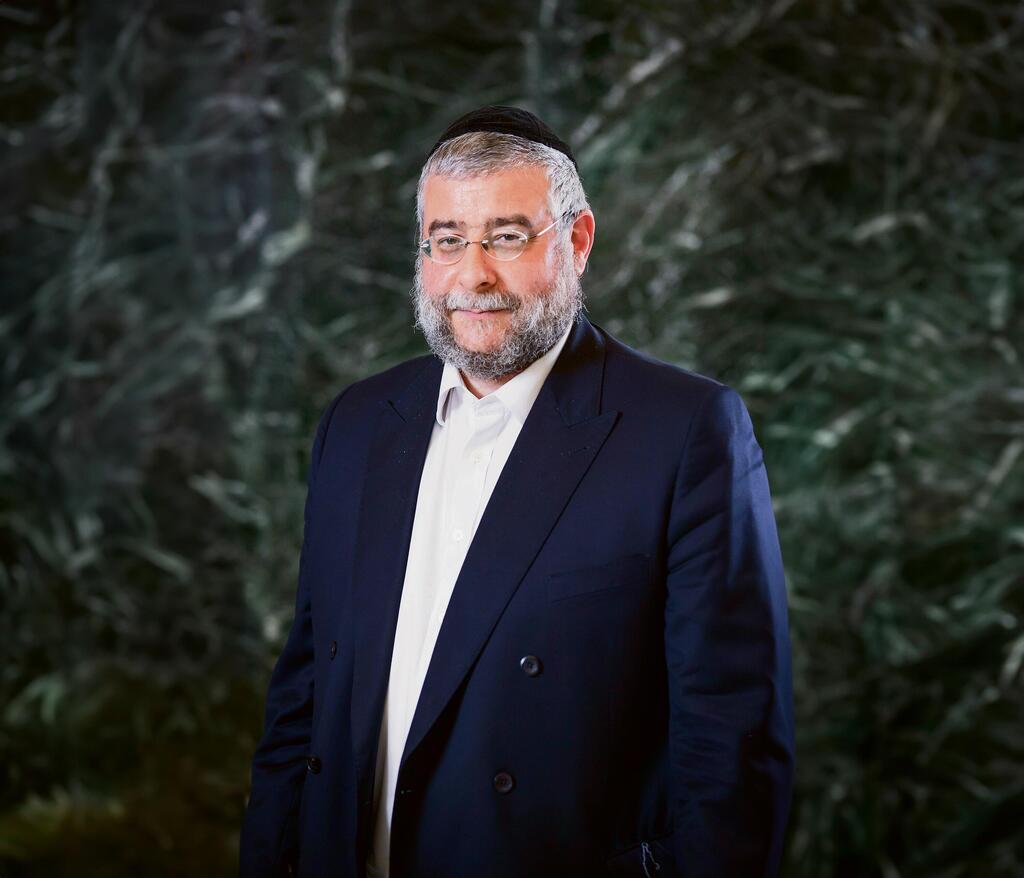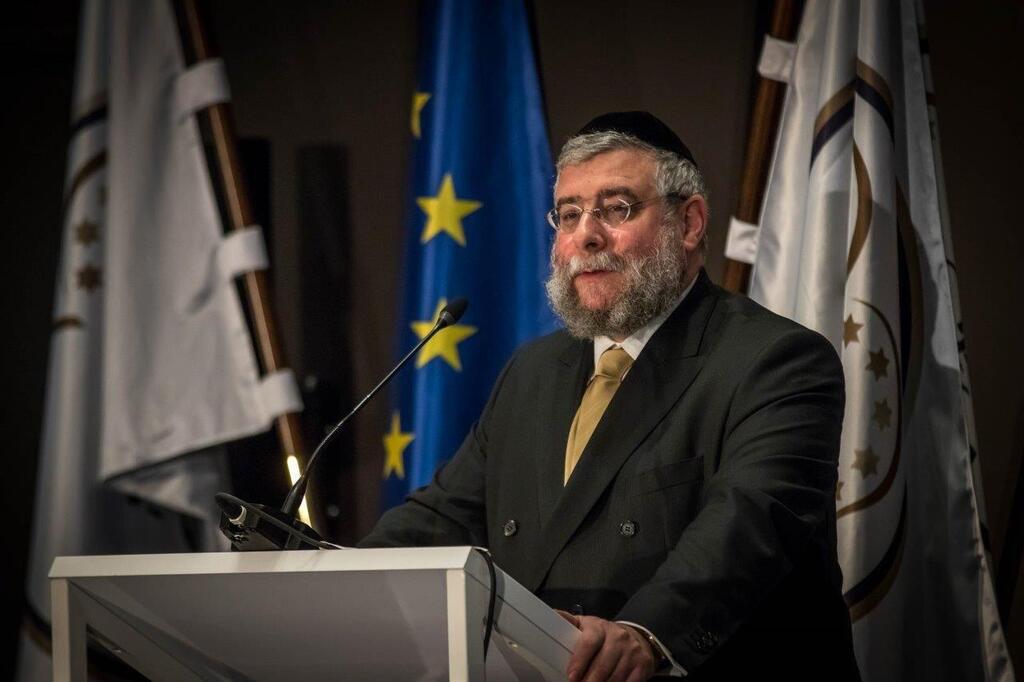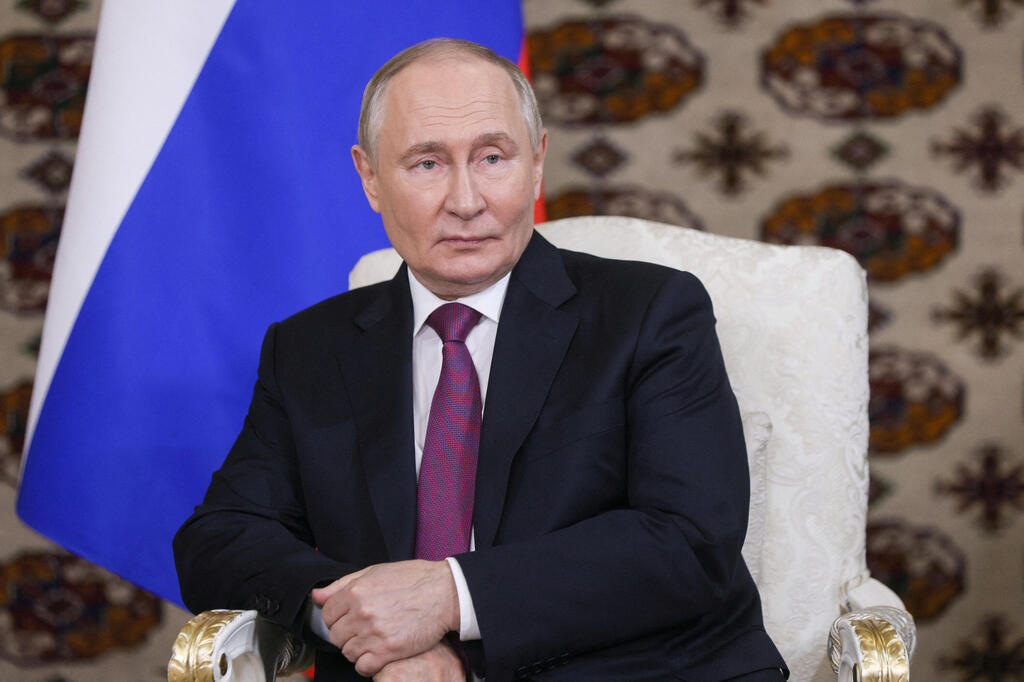Getting your Trinity Audio player ready...
In 2022, Rabbi Pinchas Goldschmidt was re-elected as Moscow's chief rabbi. Less than a year later, however, Goldschmidt—who has served as president of the Conference of European Rabbis, representing 700 communities since 2011—was forced to end his decades-long tenure in Moscow. His journey began in Mikhail Gorbachev’s Soviet Union, open to the West, and concluded under Vladimir Putin’s authoritarian Russia.
The departure was involuntary. Goldschmidt, along with other religious leaders, was pressured by the Russian government to publicly support its war in Ukraine, a demand he refused.
The Russian Justice Ministry alleged he had “spread false information about decisions of the Russian Federation’s public authorities and their policies” and opposed the "special military operation in Ukraine.”
Goldschmidt was labeled a “foreign agent,” the first religious leader since the start of the war to receive this designation. Initially, he left his role to help evacuate Jewish refugees from Ukraine, ultimately resigning and returning to Israel.
“I went to sleep in Moscow and woke up in Tehran,” Goldschmidt said. “I think I could return, but I don’t know what might happen if I land there. Russia has taken a dark turn, and I’m proud to be on the right side of history, standing against this terrible war. If I’m considered a foreign agent, then as God’s agent, the next step may be declaring God himself a foreign entity.”
You abandoned a thirty-year project.
"I said the war would be catastrophic for Ukraine, Russia and the Jewish communities within them. The ‘foreign agent’ label may very well be the opening shot of a new wave of antisemitism against the Jewish community. Over a year ago, I urged Jews to leave Russia before it was too late. Since then, over 35% of the Jewish community has left the country.”
They declared you a “foreign agent.” Is this tied to your Judaism?
“Putin is running an anti-Jewish campaign. He’s leveraging his Jewish allies who say that [Ukrainian President Volodymyr] Zelensky is an embarrassment to the Jewish people. I don’t believe Putin himself is antisemitic, but Russia’s new post-war, closed-off structure leads it to reject anything foreign—a recipe for antisemitism. Why did they suddenly recall a statement I made in 2023? One reason is Israel’s growing closeness to Ukraine and the possibility it may supply weapons. But historically, when a regime starts to falter, it starts looking for scapegoats, and it’s often the Jews. The same happened at the end of Stalin’s era.”
Why did you remain silent in 2014 but are speaking now?
“Back then, the world was silent, and sanctions were merely symbolic. But anyone with a sense of foresight could see that Russia was isolating itself from the West. Today, you can see parliament has become a rubber stamp for the government; there are no free elections, no alternative parties—only the ruling party. Life is increasingly under dictatorship, more so than it was when I first arrived in Russia.”
To Moscow in a time machine
Rabbi Goldschmidt, born in Zurich and the great-grandson of the city's chief rabbi (as well as a descendant of Danish Jewry), moved to Israel at age 11, studying at yeshivas in Bnei Brak before completing rabbinic ordination in Baltimore.
In the late 1980s, during his rabbinate in Nof HaGalil, Goldschmidt became involved in the spiritual integration of immigrants from the Soviet Union. In 1989, at the recommendation of his mentor, Rabbi Moshe Soloveitchik, and with the backing of Israel’s Chief Rabbinate, he was appointed head of the rabbinical court of the Soviet Union, later of the Commonwealth of Independent States, eventually becoming Moscow’s chief rabbi.
Goldschmidt was instrumental in founding the Russian Jewish Congress and establishing Moscow’s Ohel Yaakov Yeshiva and Etz Chaim Jewish School. He is also known as the rabbi to several prominent Russian oligarchs, including Arkady Gaydamak.
Since 2011, Goldschmidt has served as president of the Conference of European Rabbis, often regarded as the “chief rabbinate” of Europe, liaising with European authorities on behalf of Jewish institutions.
In his current role, Goldschmidt brings a wide perspective on the state of European Jewry, which faces rising hostilities from both far-left and far-right factions, as well as from Islamic extremism following the October 7 massacre.
This interview takes place on the one-year anniversary of the tragedy and just after Goldschmidt concluded the mourning period for his father’s passing.
Goldschmidt recalls his father as a businessman who sold conveyor machinery to Mongolia and the Soviet Union. "He traveled there in the 1970s, met with refuseniks and spoke about the heroes who defied the KGB and authorities to live Jewish lives unofficially. That ignited a spark in him, and later in me, regarding Soviet Jewry."
Is there something distinct about Russian Jews?
“Under communism, their Judaism was secular, but it held deep warmth toward Jewish heritage. Once they had a chance to reconnect, most did—making Aliyah, joining Jewish communities and those who stayed also rekindled Jewish life.”
What did you encounter on arrival?
“It was like traveling through time. Cars and clothes looked 40 years out of date, and people were afraid to speak openly. From a Jewish perspective, no one there had ever heard of ‘six million Jews.’ Holocaust terminology didn’t exist. They knew they ate matzah in the spring, were hated, suffered because they were Jewish and that there was a Jewish state.”
In that reality, how did you even start?
“Before I left, the chief rabbi of Israel at the time, Rabbi Avraham Shapira, advised me to meet Rabbi Moshe Rosen, Romania’s chief rabbi, who had preserved a thriving Jewish community under communism and convinced authorities to allow Jews to make Aliyah. Rosen told me to focus on the youth, not the elders, and to work through schools, not synagogues.
“He also said I had to ‘be more communist than the communists,’ to speak of workers’ rights, universal values and draw on examples from Moses’ actions to show that a Jewish leader also helps non-Jews who suffer.”
What developed from there?
“After years of underground Jewish life, things changed. Suddenly, being Jewish meant you could travel to Israel, Germany or the U.S. without a visa. That required halachic rulings on who was truly Jewish.
“From 1991 to 1996, during the Yeltsin years, most Jews wanted to emigrate, but some wanted to stay and rebuild their lives as Jews in modern Russia. Judaism was a smaller part of their identity. Yeltsin’s circle included many Jews. Wealth grew. Rabbis from the West came and refuseniks like [Nathan] Sharansky left for Israel. There was no unified leadership, and barely any community.”
Now you’ve taken a drastic step.
“The war has turned Russia into a semi-totalitarian state, blocking social media and outside information, like Iran or North Korea. When religious leaders were pressured to support the war—driven by public fear and anger—I knew we were shifting from an authoritarian to a quasi-totalitarian regime. I realized this could spell the end of Russia’s Jewish community, so I chose to oppose the war, support Jewish refugees, resign and leave Russia. Months later, as casualties rose, the war dragged on and a general mobilization, including Jews, seemed likely, I told people, ‘Leave before it’s too late.’
"I know what Putin does to opponents, and he doesn’t forget. I have personal security most of the time, but sometimes you have to speak up. Today, being a public Jew is no easy task—the danger is almost everywhere. But I’m aware Putin has unfinished business with me.
“Since October 7, Russia has also adopted an anti-Israel stance, bringing back institutional antisemitism. Jewish life has become much quieter, more private. Unlike communities worldwide, you won’t see images of the hostages in Russian Jewish communities.
“In Western Europe, communities fear street violence, but in Russia, fear has returned to government-driven antisemitism. Almost every Jewish leader in Russia today must cooperate with the regime.”
Returning to the synagogue
In January, Goldschmidt was awarded the prestigious Charlemagne Prize for his work advancing Jewish life in Europe and promoting interfaith and intercultural dialogue. Past recipients include Zelensky, Pope Francis and UN Secretary-General António Guterres.
Is there a future for European Jewry?
“There’s a general European consensus on the basic obligation to protect Jewish communities. Most European governments do a lot to safeguard the community, but personal security remains a serious concern.
Why doesn’t the progressive left view Jews as a minority? “There’s a personal and collective belief—like on university campuses—that Jews control the world. Many Israeli and Jewish academics publicly criticize Israel whenever possible."
“Part of the problem stems from some countries’ unacceptable stance on Israel. I’ve told the Spanish and Irish governments that their policies toward Israel directly impact Jewish safety at home. This dynamic is felt strongly in the streets and among immigrant communities. The far right also poses an ideological and political threat, but over the past year, the physical danger has intensified from radical Islam.”
Many Jews support the far right.
“A Jew voting in the Netherlands, France or Austria may prioritize personal security, so they’ll support someone or a party that could undermine democracy, perhaps even praise Nazis and Hitler, but also promises to protect them from their Muslim neighbors.”
Do you see that as legitimate?
“The threat of the far right shouldn’t be underestimated. I lived in Russia for 30 years and saw what happens when a country ceases to be democratic. I don’t want that to happen in Europe.”
But left-wing parties, some of which turn their backs on Israel, empower the far right by failing to address core issues.
“As long as European institutions don’t recognize that the threat from Iran and radical Islam is as serious as the one from Russia, the European project could be overtaken by extremists on both the left and right. More leaders are starting to understand this, but real change takes time.”
Why doesn’t the progressive left view Jews as a minority?
“There’s a personal and collective belief—like on university campuses—that Jews control the world. Many Israeli and Jewish academics publicly criticize Israel whenever possible. Then there’s the ‘successful Jew’ stereotype: a persecuted minority that knew it had to excel, to be better than everyone else. So, people feel they don’t need to help them.”
So if I have young children, should my message to them be to expect hatred?
“Zionist leaders once believed that founding the State of Israel would end antisemitism. Today, perhaps because of Israel, antisemitism has even increased. Jews in the Diaspora always supported Israel because it was their insurance policy. On October 7, it felt like that policy expired, and many who had planned to move to Israel had second thoughts. But I think recent events have renewed that insurance policy.
“Aliyah to Israel is surging, especially from countries where the traditional and religiously observant populations are larger, like the U.S. and France. They’re moving not just for personal security but to strengthen Israel when times are hard. Many are returning to synagogue, and there’s a real reawakening, especially among Jews who were deeply involved in the progressive movement.
“Since October 7, antisemitism has once again become politically correct in Europe. There’s a striking dissonance between the elites, who downplay October 7 and blame Israel for the aftermath, and ordinary citizens, who care more about personal security and often support Israel almost automatically.”
How can we help Muslim youth break out of the cycle of hatred toward Israel and Jews?
“That’s the government’s role. If social media is the biggest source of incitement, then who’s policing the algorithm? It’s a threat to Western democracy as a whole. Recently, there have been attacks by 15- and 16-year-olds influenced by online incitement. Governments have already started to take action.”
Get the Ynetnews app on your smartphone:




